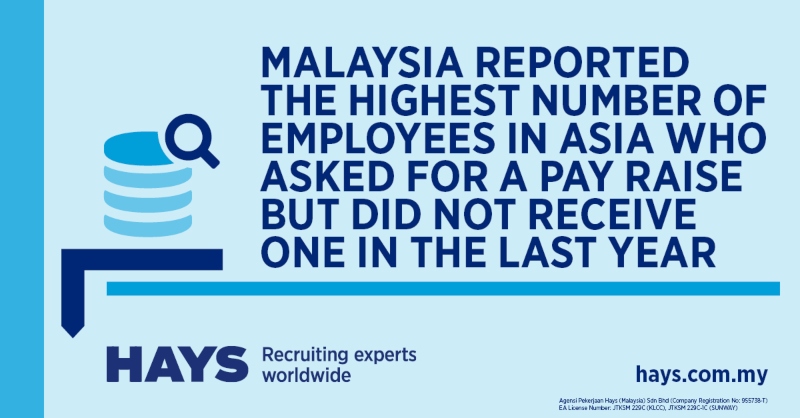MALAYSIAN PROFESSIONALS MOST UNSATISFIED WITH PAY ACROSS ASIA

Employees in Malaysia are the most dissatisfied with their current compensation packages in the region, finds the latest Asia Salary Guide report by leading recruitment experts Hays. This is likely a compounding factor in high salary expectations from employees that differ from employers’, creating potential for mismatched salary expectations in 2020.
This year marks the 13th edition of the annual Hays Asia Salary Guide, which remains a definitive snapshot of salaries for positions across industries in Asia. The salary and hiring insights, including a thorough market overview of business outlooks, salary policies and recruitment trends, are based on survey responses from close to 6000 working professionals located in the five Hays operating markets in Asia; namely China, Hong Kong SAR, Japan, Singapore and Malaysia.
Employee satisfaction low alongside mismatched expectations
Results of the guide showed that 46 per cent of employees in Malaysia were dissatisfied or very dissatisfied with their current compensation packages, the highest number to say so in Asia. Additionally, Malaysia reported the highest number of employees in Asia who asked for a pay raise but did not receive one in the last year (24 per cent).
These could be precipitating factors to the higher expectations that Malaysian respondents have for increments in 2020. The majority (27 per cent) are expecting increases ‘between 3-6%’, while others (25 per cent) are expecting increases ‘greater than 10%’ – the highest number to say so in Asia after China (40 per cent). As a contrast, the majority of employers in Malaysia (39 per cent) also expect to give out increments ‘between 3-6%’, but only four per cent are looking at increases above 10 per cent. These numbers indicate possibilities of severe mismatched salary expectations in 2020, which is further cemented by 20 per cent of employers saying they did not expect employee salaries to change at all – the highest percentage in Asia to say so.
Salaries high priority for employee attraction
Falling in line with these results, Malaysia had the highest number of respondents in Asia who were actively seeking a new job (52 per cent) and cited compensation as their top reason for doing so (67 per cent). But interestingly, compensation was not the biggest reason why employees would stay with their current employer. 41 per cent of respondents favoured ‘work-life balance’ as what would make them stay, while 38 per cent favoured ‘salary or benefit package’, followed closely by ‘work location’ (37 per cent) and ‘management style and company culture’ (36 per cent). Malaysian’s also regarded ‘training and development opportunities’ as more important than all the other Asian markets (26 per cent). This shows that while Malaysian professionals may be attracted by higher pay, benefits that ease work-life balance and difficulties like travel to work or aid in upskilling would be key in retaining them over pay.
Tom Osborne, Managing Director at Hays Malaysia commented, “As Malaysia’s brain drain continues to take some of its best talent outside of the country, it has become vital for organisations to offer more incentives to both attract and retain the best talent. These can be either monetary or non-monetary as with a mismatch in salary expectations imminent, organisations could turn the focus on more holistic benefit packages that can plug the gap by easing other areas of concern for employees. Another focus would be on upskilling, something that both candidates and organisations can look into better justifying higher increments.”
Last updated on February 18th, 2020
Hays Research
DNA Series
Uncovering the DNA of the Future Workplace

